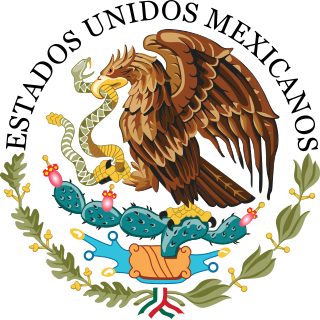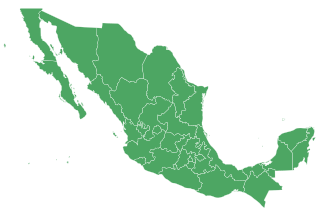
The politics of Mexico function within a framework of a federal presidential representative democratic republic whose government is based on a multi-party congressional system, where the President of Mexico is both head of state and head of government. The federal government represents the United Mexican States and is divided into three branches: executive, legislative and judicial, as established by the Political Constitution of the United Mexican States, published in 1917. The constituent states of the federation must also have a republican form of government based on a congressional system as established by their respective constitutions.

The National Action Party is a conservative political party in Mexico founded in 1939. The party is one of the main political parties in Mexico, and since the 1980s has had success winning local, state, and national elections.

General elections were held in Mexico on Sunday, 2 July 2000. Voters went to the polls to elect a new president to serve a single six-year term, replacing President Ernesto Zedillo Ponce de León, who was ineligible for re-election under the 1917 Constitution. The election system ran under plurality voting; 500 members of the Chamber of Deputies for three-year terms and 128 members of the Senate for six-year terms.

Federal elections were held in Germany on 12 January 1912. Although the Social Democratic Party (SPD) had received the most votes in every election since 1890, it had never won the most seats, and in the 1907 elections, it had won fewer than half the seats won by the Centre Party despite receiving over a million more votes. However, the 1912 elections saw the SPD retain its position as the most voted-for party and become the largest party in the Reichstag, winning 110 of the 397 seats.

The Liberal Party, commonly known as the Blue Party, was a political party in Paraguay, ruling the country for most of the period between 1904 and 1940.

Legislative elections were held in Mexico on 18 August 1991, alongside gubernatorial elections in six states. The Institutional Revolutionary Party (PRI) won 320 of the 500 seats in the Chamber of Deputies and 31 of the 32 seats up for election in the Senate. Voter turnout was 61% in the Chamber election and 62% in the Senate election.
Legislative elections were held in France on 17 June 1951 to elect the second National Assembly of the Fourth Republic.

General elections were held in Mexico on 7 July 1946. The presidential elections were won by Miguel Alemán Valdés, who received 77.9% of the vote. In the Chamber of Deputies election, the Institutional Revolutionary Party won 141 of the 147 seats.

Legislative elections were held in Mexico on 4 July 1955. They were first federal elections in which women were able to vote after President Adolfo Ruiz Cortines introduced unrestricted citizenship for women on 17 October 1953, meeting one of his main campaign promises. As a result, the electorate increased from around five million in 1952 to nine million in 1955.

General elections were held in Mexico on 5 July 1970. The presidential elections were won by Luis Echeverría Álvarez, who received 86% of the vote. In the Chamber of Deputies election, the Institutional Revolutionary Party won 178 of the 213 seats, as well as winning all 64 seats in the Senate election. Voter turnout in the legislative elections was 64.4%.
A bloc party, sometimes called a satellite party, is a political party that is a constituent member of an electoral bloc. However, the term also has a more specific meaning, referring to non-ruling but legal political parties in a one-party state as auxiliary parties and members of a ruling coalition, differing such governments from pure one-party states such as Nazi Germany and the Soviet Union, although such minor parties rarely if ever constitute opposition parties or alternative sources of power. Other authoritarian regimes may also have multiple political parties which are nominally independent in order to give the appearance of political pluralism, but support or act in de facto cooperation with the government or ruling party.

General elections were held in Mexico on 4 July 1982. The presidential elections were won by Miguel de la Madrid, who received 74% of the vote. In the Chamber of Deputies election, the Institutional Revolutionary Party won 299 of the 372 seats, as well as winning 63 of the 64 seats in the Senate election. Voter turnout was 75% in the presidential election and 73% and 66% for the two parts of the Chamber elections.

Legislative elections were held in Mexico on 1 July 1979. The Institutional Revolutionary Party (PRI) won 296 of the 400 seats in the Chamber of Deputies. Voter turnout was 49%.

The Christian Democratic Party is a political party in Paraguay.

The Paraguayan Humanist Party was a political party in Paraguay.

Parliamentary elections were held in Brazil on 15 November 1970. The result was a victory for the National Renewal Alliance Party, which won 223 of the 310 seats in the Chamber of Deputies and 40 of the 46 seats in the Senate. Voter turnout was 77.5% in the Chamber of Deputies election.
Parliamentary elections were held in Hungary on 28 and 29 May 1939. The result was a victory for the Party of Hungarian Life, which won 181 of the 260 seats in Parliament and won 49 percent of the popular vote in the election. Pál Teleki remained Prime Minister. This was a major breakthrough for the far-right in Hungary; between them, far-right parties were officially credited with 49 seats and 25 percent of the vote.
General elections were held in Italy on 21 March 1897, with a second round of voting on 28 March. The "Ministerial" left-wing bloc, led by Giovanni Giolitti remained the largest in Parliament, winning 327 of the 508 seats.
Early parliamentary elections were held in Iceland on 18 and 19 October 1942. They were held after reforms were made to the electoral system following the July elections. The Independence Party emerged as the largest party in the Lower House of the Althing, winning 13 of the 35 seats.

Parliamentary elections were held in Portugal on 3 November 1957. The ruling National Union won all 120 seats.












